Social - ENA English
Social
Ethiopian Airlines Group Observes International Labour Day 2024
May 1, 2024 498
Addis Ababa, May 1/2024 (ENA) The employee and leadership of Ethiopian Airlines Group have observed the nationwide International Labour Day 2024 this morning. Speaking on the occasion, Ethiopian Airlines Group Primary Basic Trade Union President Tekalegn Terfassa said the day creates opportunity to enhance the collaboration between employee and the leadership. The president stated that "on this day we promise to ensure our industrial peace." Ethiopian Airlines Group CEO Mesfin Tasew said on his part that the day meant a lot for both the employees and the employer. On celebrating the Labour Day we are reminded of the need to extend reasonable payment, create good working environment, and strengthen unity, he added. The day makes the employer think about the success of the company, Mesfin noted, adding that but that can only be achieved by treating employees in a good manner, respecting the rights of employee, and providing essential benefits, among others. According to him, the Ethiopian Airlines Group believes that its big resource is its human resource. For the CEO, the day has equal meaning for both employees and employers. The International Labour Day or May Day has been celebrated in Ethiopia the 49th time and for 135th time globally.
Peace Minister Underscores Role of Nationwide Dialogue for Ethiopia’s lasting Peace
May 1, 2024 585
Addis Ababa, May 1/2024 (ENA) Minister of Peace Binalf Andualem emphasized the importance of a continuous national Consultation and common understanding to pave the way for durable peace and development in Ethiopia. This was disclosed at training organized for members of the House of People's Representatives, House of Federation as well as members of regional councils and speakers. In his opening remarks, Peace Minister Binalf underscored that reaching consensus on major issues of the country is pivotal to ensure sustainable peace. As a strong nation-state building endeavors has not yet been completed, the minister noted that the current generation of Ethiopia should deliver on its responsibilities and realize the ambition. To this end, constructive dialogue among the entire public as well as the elites of the country has become now instrumental to national consensus, Binalf underlined. The Ethiopian National Dialogue Commission has been currently facilitating inclusive techniques of discussion and reconciliation that heal wounds, build consensus on key troubles, and assist Ethiopia in remedying its complicated issues, it was learned. The Commission is highly expected to resolve differences of opinion on fundamental issues and forge a 'national consensus' that would bring about lasting peace and prosperity in the East African nation. We believe this national dialogue will create strong harmony and ensure durable peace, the minister hoped. A half-day training would be vital for the participants to thoroughly discuss on fundamental issues of the country including the nation-state building, national identity, Ethiopia’s interest as well as its assets for the aspiration of prosperity.
PM Shares Food Items with Low Income Staff Members, Orphans
Apr 30, 2024 657
Addis Ababa April 30/2024 (ENA) Prime Minister Abiy Ahmed has shared food items with low income staff members of the Office of the Prime Minister and orphaned children the Prime Minister (PMO) raises. The Office of the Prime Minister posted on its FaceBook page that the food sharing programme was conducted in connection with the upcoming holiday. "On the occasion of the upcoming holiday, Prime Minister Abiy Ahmed shared food items with low income staff members of the Office of the Prime Minister and also with orphaned children the PMO is helping to raise."
Disaster Risk Mgmt Commissioner Stresses Need to Start Work to End Relief Handouts
Apr 29, 2024 1021
Addis Ababa, April 29/2024 (ENA) The Disaster Risk Management Commission (DRMC) Commissioner, Shiferaw Teklemariam underscored the need to work hard with a view to sustainably free the nation from waiting for emergency relief handouts. This message comes after the successful completion of a critical pre-deployment training program for over 100 DRMC leadership and staff members at the African Leadership Excellence Academy. Disaster Risk Management Commission Commissioner Shiferaw Teklemariam emphasized the importance of this shift in Ethiopia. “We must have a comprehensive understanding of our Commission, policies, and activities – especially not just relief handouts, but how to end reliance on them altogether." Shiferaw said that it may be difficult to shortly springboard towards this sustainable solution but the work should start now stressing that the reliance on relief handouts, which lasted for over six decades, should gradually end. He pointed out the agricultural potential resources across many regions of the country to move beyond the decades-long cycle of relying on emergency aid. In February, the Council of Ministers approved a revised Disaster Risk Management Policy, replacing the one used for the past two decades. Following this, the commission implemented human resource reform to effectively manage and respond to any multi-hazard natural and manmade challenges in the country. It is our duty to manage and respond to any multi-hazard, including sufferings from lack of nutrition, flood and hunger, he pointed out.
PM Calls for More Contributions to 'Clean Streets - Healthy Lives' Digital Telethon
Apr 28, 2024 1098
Addis Ababa, April 28/2024 (ENA) Prime Minister Abiy Ahmed has called for additional contributions to the 'Clean Streets - Healthy Lives' digital telethon. The Premier unveiled plans last Friday to construct modern, clean and dignified public restrooms, with a strong emphasis on community involvement in their construction. The initiative, named ‘Clean Ethiopia,’ includes a fundraising component under the theme ‘Clean Cities – Healthy Lives.' Prime Minister Abiy extended gratitude to everyone who has joined the 'Clean Streets - Healthy Lives' digital telethon today. "We are colorful when we come together for a collective cause," he said. For those who haven't participated yet, "I encourage you to join the Clean Ethiopia digital telethon today and in the days and weeks ahead. Together, we can make a significant impact,” Abiy posted on his Facebook page. Everyone is invited to join the "Clean Streets - Healthy Lives" movement by contributing into the Commercial Bank of Ethiopia account: 1000623230248. The objective is to solicit both cash and in-kind contributions for the construction of these public facilities. To showcase this initiative, a prototype has been constructed and prominently displayed within the city, providing a tangible example of the modern and dignified public toilets that will be implemented in the identified corridors.
Digital Telethon for 'Clean Ethiopia' to be Launched Today
Apr 28, 2024 1134
Addis Ababa, April 28/2024 (ENA) Office of the Prime Minister revealed that a digital telethon for 'Clean Ethiopia' will be launched today. It is to be recalled that Prime Minister Abiy Ahmed unveiled plans on Friday to construct modern, clean and dignified public restrooms, with a strong emphasis on community involvement in their construction. The initiative, named ‘Clean Ethiopia,’ includes a fundraising component under the theme ‘Clean Cities – Healthy Lives.' Accordingly, a digital telethon for 'Clean Ethiopia' will be launched today, Office of the Prime Minister revealed. Everyone is invited to join the "Clean Streets - Healthy Lives" movement by contributing into the Commercial Bank of Ethiopia account 1000623230248, it added. The objective is to solicit both cash and in-kind contributions for the construction of these public facilities. To showcase this initiative, a prototype has been constructed and prominently displayed within the city, providing a tangible example of the modern and dignified public toilets that will be implemented in the identified corridors.
Relief Assistance to Needy People Intensified: Disaster Risk Management Commission
Apr 27, 2024 1255
Addis Ababa, April 27/2024 (ENA) The provision of emergency humanitarian assistance to the needy people in different parts of the country has continued in a strengthened manner, according to the Disaster Risk Management Commission (DRMC). In an exclusive interview with ENA, Commissioner Shiferaw Teklemariam said that the victims are being provided with cash and non-cash items in response to man-made and natural calamities in different parts of the country. Humanitarian assistance has been distributed quarterly from January to March and assistance was provided to 6.6 million people, he revealed. The effort to distribute humanitarian assistance to over 8 million citizens in this quarter (April to June) is well underway. The assistance is jointly carried out by the government and partners, it was learned. According to him, the total humanitarian support of this period requires about 11 billion Birr, of which the government will cover 5.1 billion birr, and the remaining will be covered by donor organizations. The main focus of the government will be preventing disasters, the commissioner stated, adding that identification of vulnerabilities and profiles have been carried out in more than half the woredas in the country.
UN Senior Program Coordinator Commends Ethiopia’s Effort to Bring Structural Change in Food System
Apr 27, 2024 838
Addis Ababa April 27/2024 (ENA) Ethiopia’s effort to bring structural change in its food system is encouraging, UN Food Systems Coordination Hub Senior Program Coordinator Khaled El-Taweel said. Recall that Ethiopia presented its activities in the agriculture sector at the recent 10th Session of the Africa Regional Forum on Sustainable Development in Addis Ababa. In an exclusive interview with ENA, Khaled El-Taweel, Senior Program Coordinator at the United Nations (UN) Food Systems Coordination Hub, said he attended the presentation at the forum. According to him, Ethiopia’s success in becoming wheat self-sufficient by boosting production and productivity has become best practice for other African countries. The senior coordinator also stated the readiness of his institution to support the sector based on Ethiopia’s need in collaboration with other UN agencies. El-Taweel noted that ensuring structural change in food system is instrumental to eradicating poverty and famine, adding that the UN Food Systems Coordination Hub in collaboration with other development partners is supporting African nations in their effort to bring structural change in food system.
Health Minister Underscores Importance of Collaboration in Advancing Global Health Security
Apr 27, 2024 747
Addis Ababa, April 27/2024(ENA) Health Minister Dr. Mekdes Daba underscored today the importance of collaboration and partnership in addressing complex health challenges and advancing global health security. Recall that the World Health Assembly established an Intergovernmental Negotiating Body (INB) to draft and negotiate a convention, agreement or other international instrument under the Constitution of the World Health Organization to strengthen pandemic prevention, preparedness and response in December 2021. Speaking at a high level ministerial consultative meeting for Intergovernmental Negotiation Body (INB) held in Addis Ababa, the minister said the ongoing discussions within the World Health Organization present a unique opportunity to reassess and strengthen the international health regulations and make new treaty that forms the foundation of collective response to health emergencies. “It is within these deliberations that we (Africans) can redefine our strategies and commitments to ensure a more resilient and effective global health system.” According to her, the health systems, already strained by endemic diseases and under-funding, were pushed to the brink as the virus spread across communities. However, the minister said Africa has demonstrated remarkable resilience, innovation, and solidarity amidst these challenges. COVID-19 pandemic has acted as both an illuminating beacon of Africa's collective strength and an unforgiving mirror reflecting its vulnerabilities. “As we (Africans) navigate these challenging times, it is imperative that we not only learn from our past experiences but also pro-actively shape the future of global health security. The challenges we face demand a comprehensive and coordinated approach to pandemic prevention, preparedness, and response.” Dr. Mekdes stated that Ethiopia, in her role as the coordinator for Africa, recognizes the importance of amplifying Africa's voice in the crucial negotiations to take place in Geneva next month. “Through collaboration with Africa CDC and other regional partners, we are committed to ensuring that Africa's priorities are not only heard but also integrated into the final agreements.” Furthermore, Ethiopia is committed to building consensus on strategic engagement in the final stages of negotiations, recognizing that collective strength lies in unity and solidarity. Africa CDC Director-General Jean Kaseya said on his part that the meeting aims to enhance Africa’s collective position in global health negotiations and readiness for outbreaks and health emergencies as a unified bloc, drawing on existing experiences and collaboration within and beyond. The high-level gathering has brought together ministers of health and representatives of ministries of foreign affairs as a move to leverage political and strategic policy support within the AU frameworks to solidify Africa's stance on pandemic prevention, preparedness, and response within the global health community.
Commission Revamping Disaster Response Works to Address Humanitarian Needs
Apr 26, 2024 733
Addis Ababa April 26/2024 (ENA) The Disaster Risk Management Commission (DRMC) stated that it is undergoing a significant overhaul to strengthen its ability to manage and respond to the uncertain humanitarian needs. The commission has started pre-deployment training for management and staff of the commission at the African Leadership Excellence Academy today. Disaster Risk Management Commissioner Shiferaw Teklemariam on the occasion said the commission is implementing reforms, including revised policy, new human resources structure, preparedness in terms of resources and technology to manage and respond to the uncertain humanitarian needs. The Council of Ministers has approved the revised Disaster Risk Management Policy in February which was in use for about 20 years. The reform activities following the implementation of the revised policy, will equip the commission with more qualified and agile workforce prepared to handle emergencies, he stated. According to him, the commission should also be equipped with the necessary human and material resources as well as technology to strengthen its ability to manage and respond to the uncertain humanitarian needs in the country. Therefore, the commission is undergoing an internal reorganization to streamline operations and optimize its effectiveness in tackling humanitarian crises. The reform activities are crucial at a time when aid is dwindling while the need is huge, he noted, adding that the government shouldered most portion of the humanitarian burden to save likelihoods, compromising other development activities. However, with dwindling support from international stakeholders, it is crucial for the commission to become more self-sufficient and adept at managing these complex situations, he stressed. The revamped commission will be better equipped to anticipate, prevent, respond to, and recover from disasters, ultimately safeguarding the well-being of Ethiopian citizens during times of crisis.
Kalazar Drug Enters Phase Two Clinical Trials in Ethiopia
Apr 23, 2024 1585
Addis Ababa, April 23/2024 (ENA) The Kalazar treatment drug has reached an exciting milestone as it enters the crucial phase two clinical trials in Ethiopia. This development brings renewed hope for the effective and patient-friendly treatment of Kalazar, also known as visceral leishmaniasis, a disease that poses a significant health challenge in Eastern Africa. Director of the Kalazar Disease Research and Treatment Center at the University of Gondar, Dr. Samuel Teshome highlighted the significance of this progress and the opportunity it presents for developing a safe and efficient cure for Kalazar in Ethiopia for new cases of the disease has been increasing in the country. According to him, Kalazar is a parasitic disease that ranks as the second deadliest globally, following malaria. It is characterized by symptoms such as persistent fever, weight loss, and enlargement of the spleen and liver. Without proper treatment, the disease can be fatal, he said. It is primarily transmitted through the bite of infected sandflies and is endemic in 80 countries, particularly in Eastern Africa, South Asia, and Latin America. Dr. Samuel said Eastern Africa currently bears the highest burden of Kalazar cases. Alarmingly, children under the age of 15 accounts for half of the 50,000 to 90,000 new cases reported each year. The research has been carried out in collaboration with researchers and laboratory institutions of various countries, he pointed out. The current treatment for Kalazar in Ethiopia involves a 17-day regimen of painful daily injections administered at hospitals, Dr. Samuel said. However, the newly developed drug, LXE408, offers a promising alternative. According to Dr. Samuel, LXE408 is administered orally in the form of pills, which is expected to provide improved efficacy and safety compared to the existing treatment options. This patient-friendly approach has the potential to revolutionize the way Kalazar is treated, offering a more convenient and accessible solution. The drug is expected to have high level of curability with very little side effects which will be available easily in health centers in villages. Research and Treatment Center (LRTC), co-Principal Investigator of the clinical trial at the Leishmaniasis at the University of Gondar Dr. Eleni Ayele, emphasized the significance of conducting the phase two clinical trial in an endemic country like Ethiopia. She highlighted the limitations of the current treatment options, which can be potentially toxic, require injections and cold-chain supplies, and often necessitate patients to travel long distances and stay in hospitals for extended periods. The goal of the research is to develop an oral treatment that is both efficacious and less toxic, allowing patients to receive care at primary healthcare facilities near their homes, she said. This approach could significantly reduce morbidity and transmission rates associated with Kalazar, bringing the treatment closer to the affected communities, the researcher added. The Director of the Leishmaniasis program at the Drugs for Neglected Diseases initiative (DNDi), Dr. Fabiana Alves also emphasized that the clinical trial for LXE408 represents a significant step towards delivering better, patient-friendly, and effective medicines that are accessible to all those in need. The clinical trial in Ethiopia is financially supported by the European and Developing Countries Clinical Trials Partnership (EDCPT) as part of the VL-INNO project, which involves a diverse range of partners. This collaboration ensures that the research is well-resourced and supported by various stakeholders, further enhancing its potential impact.
Gov’t Reaffirms Commitment to Implementing Transitional Justice Policy
Apr 19, 2024 2319
Addis Ababa, April 19/2024(ENA) The Government of Ethiopia is committed to implementing the Transitional Justice Policy which is essential to ensure lasting peace in the country, House of People's Representatives (HPR) Chief Government Whip Tesfaye Beljige said. The chief government whip gave the assurance at a consultative meeting held for parliamentarians and high government officials to discuss the Transitional Justice Policy approved this week by the Council of Ministers. Addressing the meeting, Tesfaye Beljige said the experience of various countries show that appropriately implementing transitional justice is crucial to sustainable resolution of complex crises. The government has, therefore, shown unwavering commitment for the realization of transitional justice starting from taking the initiative in preparing the document, he added. Tesfaye elaborated that transitional justice is an important tool to solve deep rooted problems and the government has a clear position to bring lasting peace and stability in Ethiopia by resolving disputes arising from the past through forgiveness. For him, the role of all stakeholders is essential to realize the historic national dialogue and the Transitional Justice Policy. House of People's Representatives Speaker, Tagesse Chaffo said on the occasion that implementing the policy is essential for a better Ethiopia. Designing and implementing a participatory transitional justice based on the nation's political and social circumstances with a clear policy framework is vital, he underscored. The speaker, who noted that the Ministry of Justice has a huge role for monitoring and coordinating the implementation of the policy and law documents, affirmed that the HPR will continue its unwavering support to the implementation of transitional justice. Recall that Ethiopia has been making various attempts to resolve human rights violations, civil conflicts, unwarranted narratives and abuses that had occurred and continue in different eras with a wide range of victims and perpetrators.
Field Marshal Birhanu Extends Condolences over Death of Kenya's Defense Chief
Apr 19, 2024 2166
Addis Ababa, April 19/2024(ENA)-Chief of General Staff of the Ethiopian National Defense Force (ENDF), Field Marshal Birhanu Jula, has expressed his condolences over the death of General Francis Omondi Ogolla, Kenya's Chief of Defense Force. In his message of condolences on behalf of the ENDF and himself, Field Marshal Birhanu expressed his compassion to the bereaved families and friends of the top military officers who lost their lives in a helicopter crash. He stated that General Ogolla has hugely contributed to peace and security of his country as well as the region. Field Marshal Birhanu affirmed that the ENDF will stand by Kenyans at this difficult time. Kenya began today a three-day mourning after its defense chief and nine other senior military officers were killed in a helicopter crash. The helicopter was carrying 11 people, including the Kenyan Chief of Defense Force Gen. Ogolla, when it crashed on Thursday and caught fire in a remote area near the border with Uganda, killing nine people on board.
Chinese Language Learning Gaining Momentum in Africa, Says UNECA Director
Apr 18, 2024 2202
Addis Ababa April 18/2024 (ENA) There is a growing interest and promising future for learning the Chinese language in Africa, according to UNECA Africa Center for Statistics Director Oliver Chinganya. Addressing the celebration of the Chinese Language Day at the UNECA (United Nations Economic for Africa) in Addis Ababa today, the director noted that among the numerous reasons why people are increasingly interested in learning Chinese is its being one of the six official working languages of the United Nations. The growing ease of travel to China, expansion of Confucius Institutes in the continent, and the vast economic opportunities that come with Chinese language proficiency are the other reasons, Chinganya added. According to him, there were 62 Confucius institutes in 45 African countries in 2021. The number of students enrolled in the Chinese language programs also surpassed the number of students in many European countries. The director claimed that the number of people learning Chinese worldwide is nearing 40 million, and is projected to reach 100 million by 2026. Chinganya finally called for a stronger partnership between UNECA and China's Mission to the African Union, along with other multilateral partners. Head of China's Mission to the African Union, Hu Changchun, echoed the importance of learning Chinese to understand China. Emphasizing the worldwide surge in demand for Chinese language proficiency, he reaffirmed his government's commitment to addressing global needs such as peace, development, and cooperation.
Dev’t Partners Pledge 630 mln USD to Ethiopia’s Climate Induced Humanitarian Assistance
Apr 18, 2024 1514
Addis Ababa, April 18/2024 (ENA)Global development partners pledged 630 million USD to support the humanitarian assistance induced by climate change in Ethiopia, Foreign Affairs Spokesperson Nebiyu Tedla said. In his biweekly briefing today, Spokesperson Nebiyu said that Ethiopia has achieved numerous diplomatic gains in the last 6 years of reform. The high-level pledging conference in Geneva co-sponsored by Ethiopia, Britain and the United Nations received nearly about 630 million USD in pledges to provide humanitarian assistance for Ethiopians suffering from the ill effects of climate change, it was indicated. Ethiopia is gaining encouraging results towards food security; particularly with the dry season wheat, he stated, and added that it is journey to ensure self-reliance. In addition to that, Ethiopia made efforts to engage the diaspora in every national developmental agenda, Nebiyu said, and emphasized that Ethiopia has gained 20 billion USD through remittance over the last 5 years. Moreover, the diaspora has contributed about 55 million USD to accelerate the completion of the national flagship project Grand Ethiopian Renaissance Dam (GERD), the Spokesperson elaborated.
Religious Fathers Have More Serious Calling to Teach People to Live Together: Kenya Inter-Religious Council Head
Apr 17, 2024 1219
Addis Ababa, April 17/2024 (ENA) There is a more serious calling now for religious fathers to teach about other people and how we can live together, the Executive Director of Inter-Religious Council of Kenya Abdirahman Ismail told ENA on the side lines of the Second International Religious Institutions Conference held in Addis Ababa. We have very many challenges and conflicts around us in the Horn of Africa region, which is prone to conflict, the executive director noted, adding that the conference is about the spirit of peace, Christians, Muslims and people of other faiths. Speaking about the role of religious leaders, Ismail said there is a more serious calling now for religious fathers to teach about other people and how we can live together. In Ethiopia different religions have been coexisting for a long period. Both Christianity and Islam have great history, he noted. “The Prophet of Islam, Muhammad, peace be upon him, sent his companions to go to Ethiopia. He told that they will get protection and safety there. There was a just Christian leader at the time. Ethiopia is also a country that has a long history devoid of colonialism.” According to him, the people have learned that Ethiopians all together make one great Ethiopia. “Ethiopia is a great nation, and it's a leader in Africa. When Ethiopia succeeds, the rest of Africa will succeed, especially the Horn. We (therefore) pray for Ethiopia, we pray for Ethiopians.” The Kenya Inter-Religious Council Executive Director added that the conference is an amazing gathering that has brought people of faith and religious leaders from different faiths, including Christians Orthodox, Catholic, Evangelical, Adventist, and Muslim, among others, to Addis Ababa. “I am happy to be in Addis Ababa, which is the new flower. And I pray for the city of Addis Ababa, the new flower, and say at the outset may this flower keep blooming.” Burundi Inter-Religious Council General Secretary Louis Pasteur Nizigiyimana said on his part that the conference is very important because it’s a gathering from which we can share experiences of what others are doing in their contexts in their countries. He thinks it is important for religious leaders and fathers to have a critical role in societies. “In Burundi where I live and work, we have been implementing a project which aims to contribute to the dialogue between the political parties.” For religious leaders, it's important to play that key role even in advancing the development of our countries in Africa, Nizigiyimana underscored. Also, “it’s important for the fathers and religious leaders to give guidance and to give instruction to the youth so that they can remain in the good lands of our holy books.” Ethiopia Inter-Religious Council Secretary General, Tagay Tadele, said it is critical to work in collaboration with various religious leaders to advance interfaith harmony and human dignity, and preserve the environment. The Inter-Religious Council of Ethiopia is committed to enhancing its partnership with different national, regional and international partner organizations to advance a culture of peace, interfaith dialogue and environmental protection, he stated. G20 Interfaith Forum Association President, Professor Cole Durham, pointed out that it's very helpful to bring together religious leaders to discuss many of the pressing problems human beings face today. Maybe the most urgent social problems or problems those religious communities have cared about for literally for centuries, the professor said, adding that yet, too often in our time, people forget the importance of listening to the different religious voices. According to Professor Durham, people “care about protecting the environment and preventing trafficking. There are all kinds of common social issues that will be dealt with better if religious actors are taken into account.”
Germany Donates Medical Equipment Worth 3.6 Million Euros to Hospitals in Ethiopia
Apr 16, 2024 1537
Addis Ababa, April 16/2024 (ENA) The government of Germany donated ICU medical equipment and other materials totaling 3.6 million euros to eight teaching hospitals in Ethiopia. NIRAS Germany, project Team leader, Gert kluge handed over the equipment to Infrastructural Development and Supply Desk Head at the Ministry of Education, Zewdu Kassa today. Speaking on the occasion, Gert kluge said the support provided by the German Development Bank, KFW through the German Financial Cooperation to Ethiopia’s Ministry of Education (MoE) for capacity building and development in the biomedical sector in Ethiopia. The provision is part of 16.5 million Euro grant support launched in 2020 to support College, teaching hospitals, and Universities in different regions of the country, he added. The support aims to enhance and extend the training of biomedical technicians and engineers while upgrading medical care in the hospitals, according to kluge. “We the Biomedical project from the NIRAS Germany got the mandate from both governments to execute the procurement of equipment and tools, including the installation and the onsite training.” The Team leader further said ‘’Today, we present the first in a series of procurement that includes more than 843 piece of ICU and OR medical equipment such as ICU beds, ventilator, oxygen concentrates, patient monitors among others.” In addition, 109 pieces of Tool kits and instruments for Biomedical maintenance workshops are included in the items, he added. Infrastructural Development and supply Desk Head at the Ministry of Education Zewdu Kassa said the purpose of the project is to improve Technical and vocational Education and Training system as the Higher Education System in both quantitative and qualitative terms in the area of Biomedical Training. Beyond enhancing the capacity of the hospitals, the support will also contribute in ensuring the quality of education in the field of area as well as enhances the skill of maintenance in medical equipment and improve existing medical services rendered in the hospitals. Human Resource Development and Improvement Lead Executive Officer at the Ministry of Health Assgid Samuel also said the medical equipment will help to further strengthen the existing the medical services to patients. The items will be distributed to 8 teaching hospitals including Dilchora Hospital, Dessie Referral hospital, Adama Hospital, Felege- Hiwot Referral Hospital, Ayder Referral hospital, and Arbaminch Referral hospital, Black Lion (Tikur Anbessa) Specialized Hospital, and Jimma University Medical Center.
ASTEWLOT Film Inaugurated in Presence of PM Abiy Ahmed
Apr 16, 2024 1203
Addis Ababa, April 16/2024 (ENA) ASTEWLOT, a film produced by the Ethiopian Artificial Intelligence Institute inaugurated today in the presence of Prime Minister Abiy Ahmed. Director General of the Institute, Engineer Worku Gachena highlighted the importance of Artificial Intelligence (AI) for future betterment of the world. The Director General hailed Prime Minister Abiy for his immense contribution for the development of the sector citing the establishment of the institute and the encouraging achievements so far registered in the sector. He said currently the institute is engaged in various activities vital for the advancement of the country stressing the need to intensify efforts to further strengthen the sector. ASTEWLOT is a scientific film based on a true story, it was learned. The film is produced by the institute in collaboration with Sewgna Films Production Company.
Adwa Victory Memorial Museum Visited by Over 31,000 People in Month
Apr 16, 2024 1125
Addis Ababa, April 16 /2024 (ENA) The recently inaugurated Adwa Victory Memorial Museum in Addis Ababa has become a major attraction, drawing over 31,000 visitors in its first month of operation, the General Manager disclosed. The Adwa Victory Memorial Museum that commemorates Ethiopia's historic victory at the Battle of Adwa in 1896 was inaugurated by Prime Minister Abiy Ahmed on February 11, 2024. The architectural design of the memorial that spans five hectares itself is a powerful symbol, reflecting the unity and sacrifice of Ethiopians from all walks of life, including farmers and women. The entrance gates of Adwa Victory Memorial are also named as East Heroes Gate, West Heroes Gate, North Heroes Gate, South Heroes Gate, Cavalry Gate, Patriot Gate, and Pan-Africanism Gate. Adwa Victory Memorial, which is a symbol of the freedom of Africans and all black people, was opened for public viewing on March 16, 2024. Adwa Victory Memorial Museum General Manager, Wbayehu Mamo stated that 31,750 people have visited the memorial between March 16 and April 15, 2024. “Recall this memorial was opened to the public on March 16, 2024. The commercial area is catering to the needs of visiting customers. In addition to the history, there are also donated spaces.” The Adwa Victory Memorial has already welcomed dignitaries – heads of state, diplomats, and delegates attending the 37th African Union Leaders Conference held in Addis Ababa earlier this year. "It is our duty to inform history. This is crucial for the government because it realized the memorial after 128 years. It is pivotal to transmit the spirit of the victory of Adwa to this generation in all age levels and all people from any institution should visit it. We are bringing them here and we are working to make them grow up knowing their history and knowledge.” The memorial is well-equipped to host future African Union events, featuring a grand Pan-African Hall that can host 0ver 2,500 guests, conference rooms, restaurants, cafeterias and a children's museum. It has modern amenities, including 1,000-vehicle parking lot, gym and others.
Creating Platform for Religious Leaders to Share Best Practices, Peacebuilding Essential, Says State Minister of Peace
Apr 15, 2024 1239
Addis Ababa April 15/2024 (ENA) State Minister of Peace, Kairedin Tezera stressed the need to create a platform for religious leaders to share best practices and develop the initiative for peacebuilding and environmental stewardship. The Second International Religious Institutions conference kicked off today in Addis Ababa. The two-day conference brought together faith leaders and religiously linked institutions from various countries to discuss pressing issues, foster understanding and promote peaceful coexistence across the globe. The conference aims to foster peace, human dignity, development, and preservation of the environment, and to counter hate speech, violence and xenophobia in Africa and across the world. Speaking at the occasion, Peace State Minister Kairedin Tezera said “we stand at a crossroads. The winds of change are upon us marked by climate in crisis, yearning for societies where human dignity and rights are the cornerstone of policy and action.” At this juncture, the work of religious fathers regarding peace building and environment protection is critical than ever, he stressed. For generations, faith fathers have served as anchors of peace and foster dialogue, he underscored, adding that “today, this could be more urgent than ever.” The globe is entangled with mammoth challenges such as climate crisis, displacement, conflict, and drought. “Yet, in the middle of these challenges, there is reason for hope. Religious peacebuilding offers a powerful path forward. It is the moral authority to bridge difference, promote empathy, inspire collective action for a given legacies and secures sustainable peace,” the state minister underlined. Faith communities have a unique capacity to speak to the hearts and minds of people, fostering understanding and cooperation regardless of ethnic and cultural identities. Therefore, he underlined “ Let us create a platform for religious leaders to share best practices, extensive knowledge and develop the initiative for peace building and environmental stewardship.” We have witnessed the transformative power of religion in peacebuilding, he noted, adding the Ministry of Peace has taken exemplary action. The interfaith council which has been established brings together religious leaders from diverse traditions to address human challenges, including the critical issue of environment, he said. A Green Legacy Initiative, a nationwide tree planting program exemplifies powerful link between religious peace building and developmental action, according to the state minister. Faith leaders have been instrumental in mobilizing communities, emphasizing the connection between a healthy environment and a peaceful society. “This initiative not only combats deforestation, but also fosters a sense of shared purpose and collective responsibility for the future,” he underscored. Inter-Religious Council of Ethiopia, Secretary General Kesis Tagay Tadele said on his part that the conference will provide opportunities to discussion on key issues in which religious communities have deep interest and come up with recommendation to advance this interfaith harmony and human dignity, and preservation of the environmental. The council is committed to enhancing its partnership with different national, regional and international partner organizations to advance a culture of peace interfaith dialogue and environmental protection, he affirmed. President of G20 Interfaith Forum Association, Professor Cole Durham on his part expressed gratitude for gathering together and celebrate central religious ideas and interfaith harmony in Ethiopia. “We hope this time can be a time of building and strengthening relationships, as all of us work together to identify initiatives that can have significant practical effects. We seek not only ideas, but ideas with impact,” the professor noted. As G20 interfaith leaders, we are conscious of a number of priority areas that are already emerging, noting broader engagement with emerging food prices, pursuing successful programs on climate and other environmental concerns, he elaborated “We need not only to identify specific policy priorities, but in addition, it is vital to help global leaders understand that engagement with faith communities is itself an essential priority that holds the key to furthering countless other objectives.” Regional Director of United Religious Initiative for Africa, Mussie Hailu said religious leaders have been playing a crucial role in peacebuilding and achievement the Agenda 2063 of Africa and of Sustainable Development Goals. “In this divided and conflict torn world, we cannot remain as we are. Why can we go back to condition that are now behind us? We need to move forward in a new direction for us to live in peace without marginalizing and destroy environment,” he underlined. Moreover, he argued that we need to be responsible global citizens and play our part, to our best ability in building the peace we want to see in the world.


.jpg)
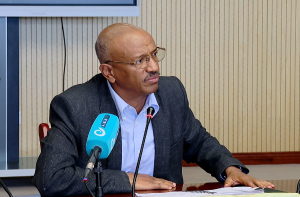
.jpg)
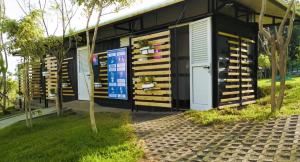
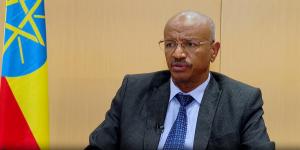
.jpg)
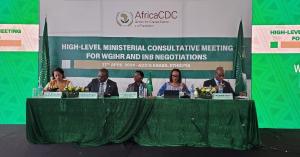
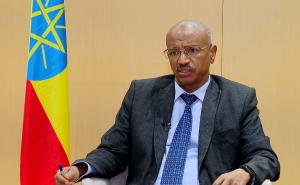
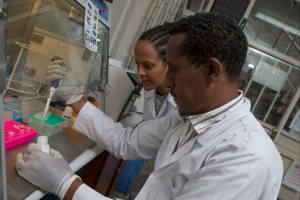
.png)

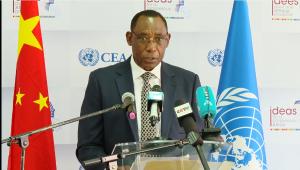
.jpg)
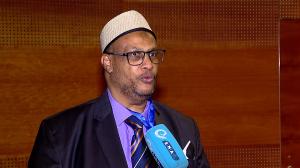
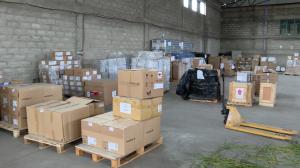
.jpg)
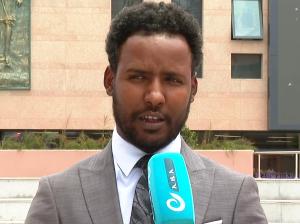
.jpg)